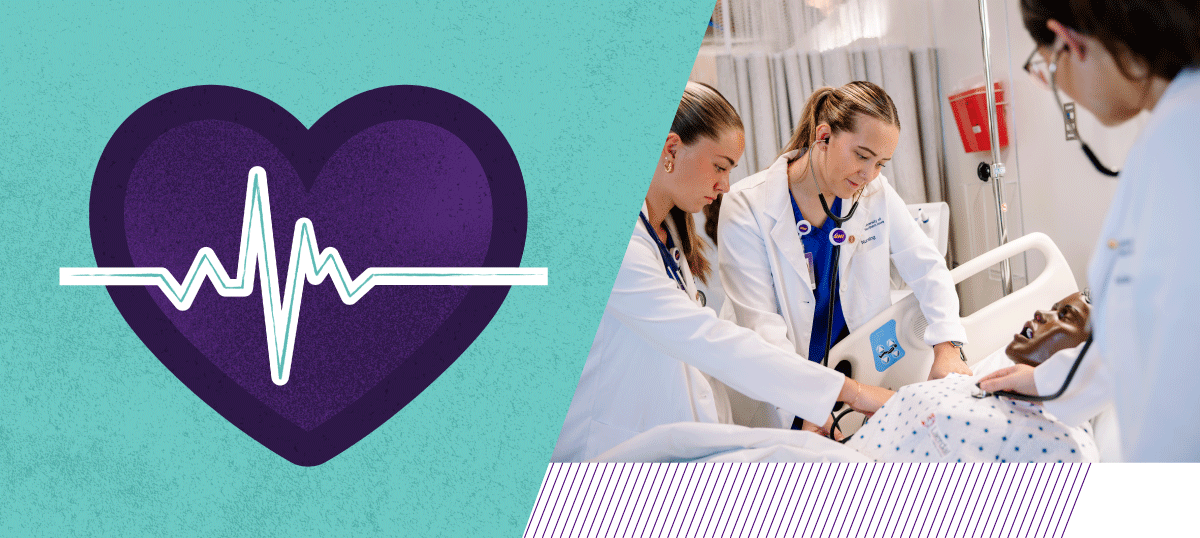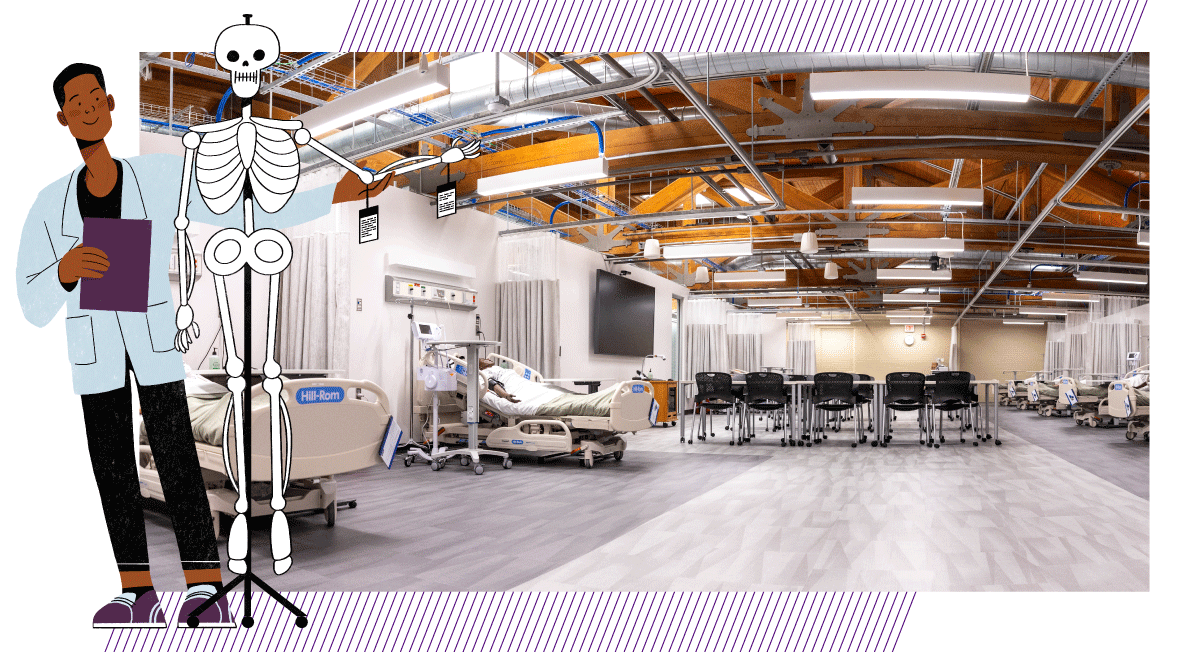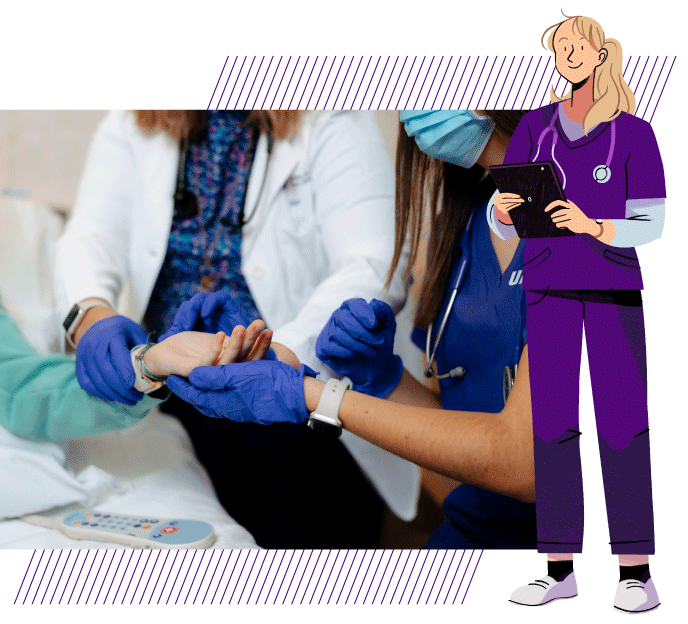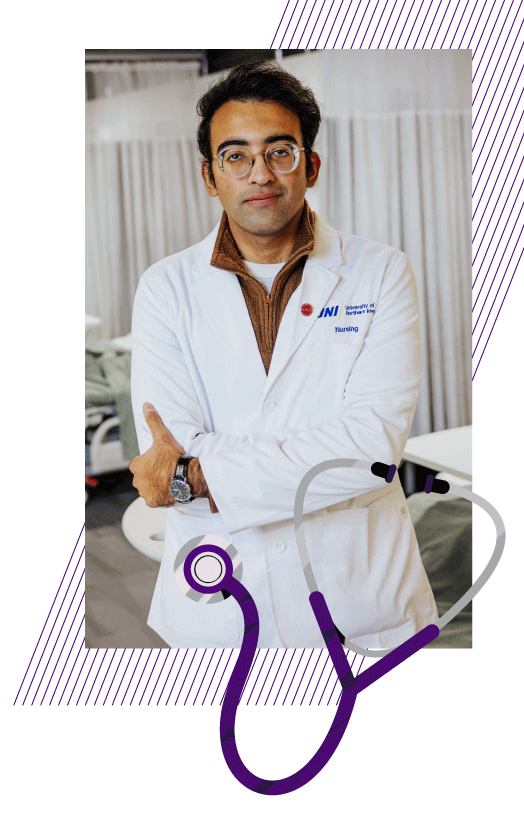Paving the future
Paving the future
UNI nursing students taking pride in their studies
From the first day of classes, Mackenzie McDonald felt the historic significance of the semester that lay ahead.
As one of 25 students in the inaugural class of standalone nursing students at the University of Northern Iowa, McDonald participated in the university’s first-ever white coat ceremony. The symbolic event marked the start of a journey not only for the students but for the university itself.
McDonald and her peers have embraced the opportunity.
“It’s definitely something that Dr. (Nancy) Kertz has instilled in us: how historic it is,” McDonald said. “This is a program that is going to really impact the university, the students and the community … I’m honored, really, to be a part of it.”

Laying the foundation
Nancy Kertz reflected on the effort leading up to the launch of the Bachelor of Science in Nursing (BSN) program. Since being hired as UNI’s chief academic nurse administrator two years ago, Kertz has led a dedicated team of scholars, administrators and facilities managers to develop the curriculum, hire faculty, secure candidacy status for nursing accreditation and design the space. She credits the program’s early success to this collaborative effort.
“I’ve developed nursing programs before, but what added a layer of complexity to this was the simultaneous curriculum design and renovation of the space,” Kertz explained. “Not only did we create a new program from scratch, but we also built an innovative model for the future — and we accomplished it all in a compressed time frame.”
Kertz emphasized that partnerships with community hospitals and clinics have been critical. While many university nursing programs face challenges securing enough clinical placements due to staffing shortages, hospitals across the state have stepped up to provide UNI students with a wide range of opportunities.
The work continues as a second cohort of nursing students began classes in January, bringing total enrollment in the BSN program to nearly 50 students.
“I’m inspired by this new generation of students,” Kertz said. “They are taking their work very seriously, and I’m excited for their future and the impact they’re going to make.”

Getting hands-on
For Norma Spiker, joining the UNI nursing program was a full-circle moment. As a junior in high school, the Pella native took an advanced Certified Nursing Assistant (CNA) course, which allowed her to shadow nurses in a hospital setting. It was then she decided that the patient interaction and direct care opportunities in nursing made it the perfect career choice.
Although she initially enrolled in a nursing program at another university, Spiker considered transferring after her first year. Coming across a media interview with Kertz about UNI’s emphasis on an integrated lab-classroom environment solidified her decision.
“I really liked that idea because I’m a very hands-on learner,” Spiker said. “The fact that we would have lecture and lab practice all in the same class instead of separating them — that sounded really cool.”
So far, the students have been focusing on health assessment and health promotion. Spiker said she was impressed by the realism and capabilities of the simulation equipment. McDonald shared how the class performed cardiac assessments on one another and used the program’s cardiac simulator to evaluate abnormal heart and lung sounds.
“I knew it was going to be hands-on, but I’ve been surprised by how active everything is,” McDonald said. “I feel like I’m practicing what I’m actually going to be doing in the field rather than just observing.”

Both Spiker and McDonald are taking pride in their classes and appreciating the close bonds they’re building with faculty and peers.
“It’s cool to know that everyone is kind of watching us to see how it’s going to go,” Spiker said. “It’s neat to be part of the first group of students paving the future for those who will come after us.”
The program gives place-bound learners with an associate’s degree throughout Central Iowa the opportunity to enhance the competencies needed to make informative financial reports, influence critical business decisions and keep an organization’s finances in check.
An unlikely journey: Muhammad Talha
Muhammad Talha has been chasing a dream.
The pursuit took him from his home country of Pakistan to Ukraine, where he began studying medicine and became the first in his family to attend a university abroad. But halfway through the six-year program, Talha’s dream was interrupted. He became one of an estimated 6 million refugees forced to flee Ukraine due to the Russian invasion.
“I evacuated on February 24, 2022,” Talha recalled. “I had to leave everything behind in my apartment — everything I owned. I took only my laptop; it was an emergency.”
Talha said he faced challenges as a refugee but emphasized that his determination kept him moving forward. After spending nearly two months in Poland, he eventually resettled in Germany.
While studying in Germany and navigating an uncertain future, Talha seized an opportunity to travel to the United States for a Model United Nations (UN) conference in New York. A chance encounter with a University of Northern Iowa student at the conference set him on an unexpected new path: to Cedar Falls, Iowa, where he joined UNI’s inaugural BSN class.
Talha’s first semester has gone “exceedingly well.”
“The faculty are taking things very slowly and adapting based on how we respond, which is something I really admire,” he explained.

After a period of instability, Talha is relieved to have found a sense of balance in Iowa. However, one aspect of life in the U.S. surprised him.
“Back in Europe, even as a medical student, I had a lot more free time,” he said with a laugh. “Here, the life of a nursing student is very busy.” Talha is currently working as a CNA in the Western Home assisted living community in Cedar Falls.

Our Tomorrow
Donors Make
Their Mark
The launch of UNI’s BSN program has been shaped by overwhelming support from alumni, donors and the health care community across the state.
A key initiative of the university’s Our Tomorrow fundraising campaign, the nursing program has received over $1.4 million in donations. Of that total, more than $800,000 has been dedicated to student scholarships, ensuring that every student in the first two nursing cohorts receives a renewable $1,000 scholarship. Additional contributions have funded renovations, equipment, programmatic support and faculty development.




